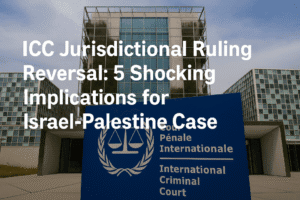ICC Jurisdictional Ruling Reversal: 5 Shocking Implications for Israel-Palestine Case
In a landmark decision, the ICC Appeals Chamber overturned a prior ruling on April 24, 2025, reviving Israel’s challenge to the Court’s jurisdiction over alleged crimes in Palestine. The Chamber found the Pre-Trial Chamber erred by inadequately addressing Israel’s argument that, as a non-member state, it retains the right to contest jurisdiction under Article 19(2)(c) of the Rome Statute. The case is now remanded for a fresh review, delaying the ICC’s investigation and reopening debates over Palestine’s statehood—a cornerstone of the Court’s authority.
While arrest warrants tied to the probe remain paused, dissenting judges warned that dismissing Israel’s procedural appeals risks undermining fairness. The ruling highlights tensions between state sovereignty and international justice, testing the ICC’s ability to navigate politically charged disputes. Ultimately, the Pre-Trial Chamber’s forthcoming decision could either legitimize the investigation or deepen accusations of bias, shaping the Court’s credibility in a polarized global landscape. This procedural pivot underscores the fragile balance between legal rigor and geopolitical realities in pursuit of accountability.

ICC Jurisdictional Ruling Reversal: 5 Shocking Implications for Israel-Palestine Case
In a pivotal ruling that could reshape the International Criminal Court’s (ICC) engagement with the Israel-Palestine conflict, the ICC Appeals Chamber reversed a prior decision on April 24, 2025, ordering a fresh review of Israel’s jurisdictional challenge. The move underscores simmering tensions over the Court’s authority in politically charged cases and sets the stage for renewed legal battles.
The Core of the Dispute
Israel had contested the ICC’s jurisdiction to investigate alleged crimes in Palestine, arguing the Court lacks authority because Israel is not a party to the Rome Statute and disputes Palestine’s statehood. In 2021, Pre-Trial Chamber I greenlit the Prosecutor’s investigation, but Israel challenged this under Article 19(2)(c), which allows states to dispute jurisdiction. The Pre-Trial Chamber dismissed Israel’s challenge as “premature,” prompting Israel’s appeal.
Appeals Chamber’s Key Findings
- Procedural Misstep: The Appeals Chamber ruled the Pre-Trial Chamber erred by inadequately addressing Israel’s jurisdictional arguments. By remanding the case, the ICC acknowledges procedural fairness must precede substantive rulings. This breathes new life into Israel’s legal strategy.
- Arrest Warrants on Hold: The Court dismissed Israel’s request to suspend arrest warrants tied to the investigation, deeming it moot after reversing the original decision. However, this leaves open whether future warrants could face similar challenges.
- Split Over Admissibility: In a 3-2 vote, the Chamber rejected Israel’s separate appeal seeking to force the Prosecutor to issue a new notice under Article 18(1), which governs preliminary admissibility assessments. Dissenting judges argued the majority sidestepped critical questions about procedural fairness.
Why This Matters
- Jurisdictional Battleground: The ICC’s authority hinges on whether Palestine qualifies as a state party. While the UN General Assembly recognizes Palestine as a non-member observer state, Israel and some allies reject this. The Pre-Trial Chamber’s re-examination could force the Court to confront this geopolitical rift head-on.
- Precedent for Non-Member States: The outcome may clarify how the ICC interacts with non-member states accused of crimes in territories of member states—a gray area with implications beyond this case.
- Timing and Politics: With the investigation paused pending the jurisdictional review, the ruling delays accountability efforts. Critics argue this risks politicizing the Court, while supporters see it as safeguarding due process.
Dissenting Voices
Judges Ibáñez Carranza and Bossa warned that dismissing Israel’s Article 18(1) appeal “undermines procedural parity” between states and the Prosecutor. Their dissent highlights a broader debate: Should the Court prioritize expediency or exhaustive procedural rigor in high-stakes cases?
What’s Next
The Pre-Trial Chamber must now reevaluate Israel’s jurisdictional challenge with stricter scrutiny. Possible outcomes include:
- Affirming Jurisdiction: Cementing the ICC’s path toward investigating alleged crimes.
- Partial or Full Rejection: Limiting the scope of the investigation or dismissing it entirely, which could spark accusations of bias.
Either way, the decision will test the ICC’s credibility as it navigates one of the most politically divisive cases in its history.
Broader Implications
This case underscores the tension between international justice and state sovereignty. For the ICC, balancing legal precision with geopolitical realities remains a tightrope walk. For victims and advocates, delays risk eroding trust in the Court’s ability to deliver accountability.
As the Pre-Trial Chamber revisits this thorny issue, the world watches—aware that its ruling could redefine the boundaries of international law in contested territories.
You must be logged in to post a comment.